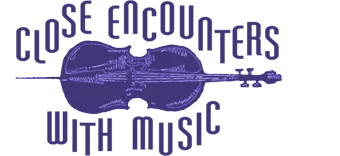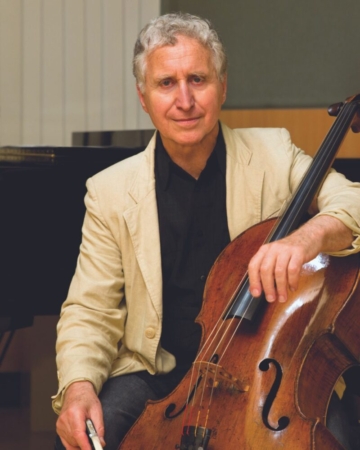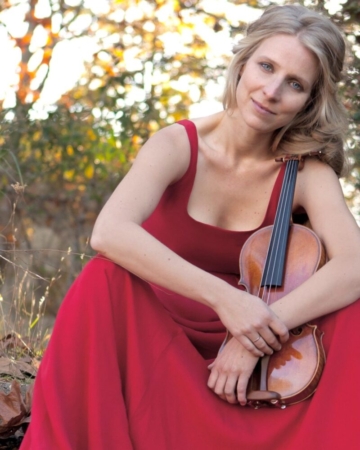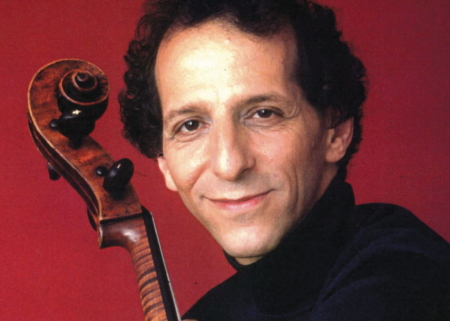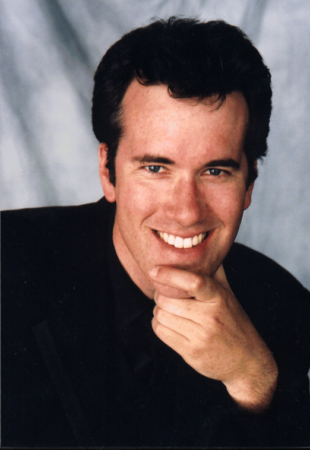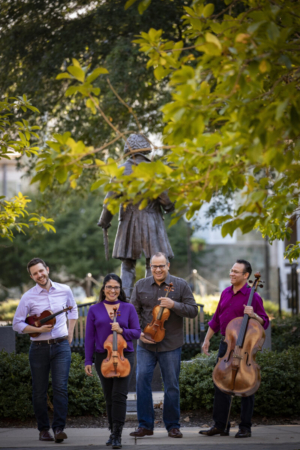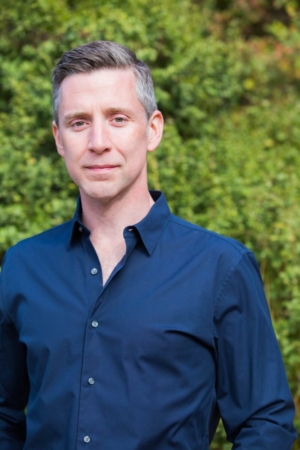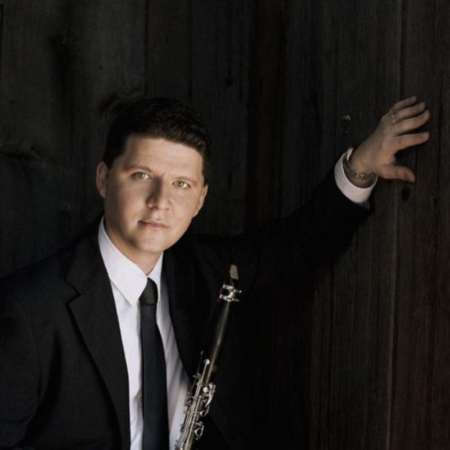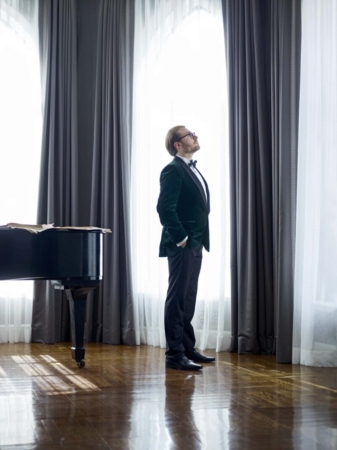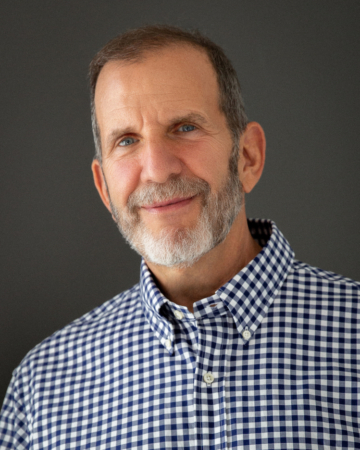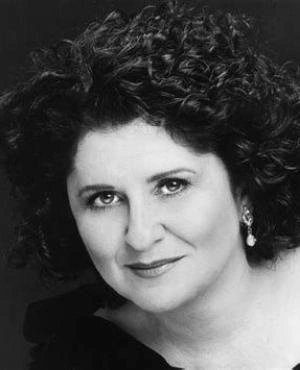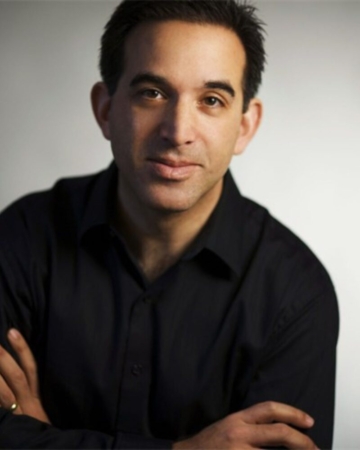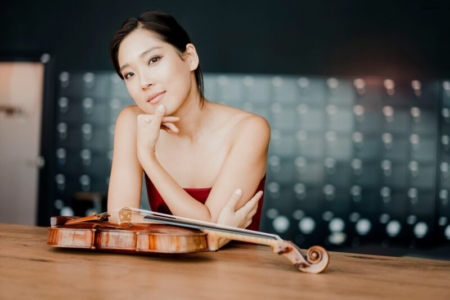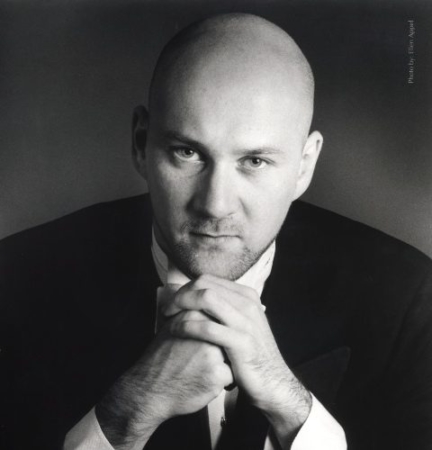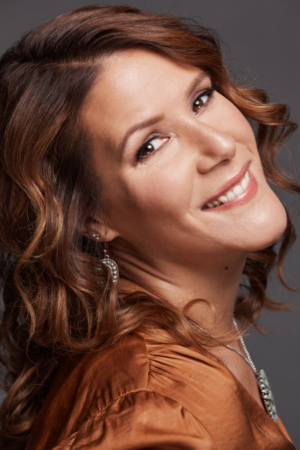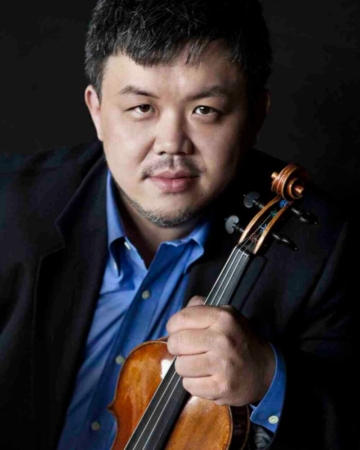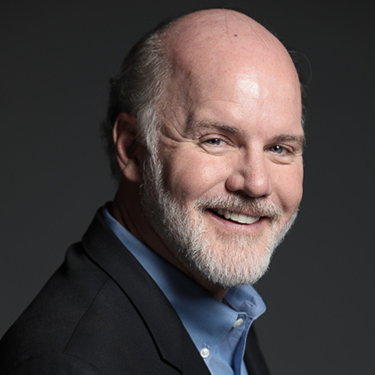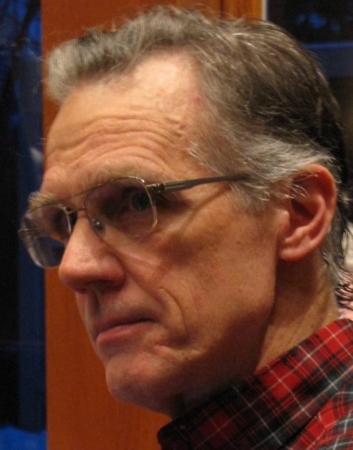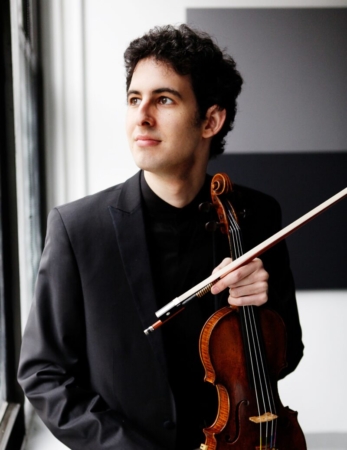Yehuda Hanani
Named “one of the most polished performers of the post-Starker generation and a consistently expressive artist” by The New York Times, Yehuda Hanani’s charismatic playing and profound interpretations bring him acclaim and reengagements across the globe. He has won wide international recognition as soloist, chamber musician and inspiring pedagogue. His concerto appearances have been with the Chicago Symphony, Philadelphia Orchestra, Baltimore Symphony, San Antonio, New Orleans, Saint Paul Chamber Orchestra, Berlin Radio Symphony, Israel Philharmonic, BBC Welsh Symphony, Irish National Symphony, Buenos Aires Philharmonic, Jerusalem Symphony, Honolulu Symphony, Taipei and Seoul symphonies among many other orchestras, and he has toured with I Solisti de Zagreb, conducting from the cello. A frequent guest at Aspen, Bowdoin, Chautauqua, Yale at Norfolk, Great Lakes, Casals Prades, Finland Festival, Ottawa, Oslo, Round Top Institute, Manchester, and the Australia Chamber Music festivals, he has collaborated in performances with preeminent fellow musicians, including Leon Fleisher, Aaron Copland, Christoph Eschenbach, David Robertson, Vladimir Fedoseyev, Itzhak Perlman, Vadim Repin, Julian Rachlin, Dawn Upshaw, Yefim Bronfman, Eliot Fisk, the Tokyo, Vermeer, Muir, Escher, Ariel, Colorado, and Manhattan quartets. His recording of the monumental Alkan Cello Sonata received a Grand Prix du Disque nomination, and on CD and in live performances, he has given premières of works of Nikolai Miaskovsky, Lukas Foss, Leo Ornstein, Paul Schoenfield, Thea Musgrave, Joan Tower, Eduard Franck, Osvaldo Golijov, Lera Auerbach, Tamar Muskal, Virgil Thomson, William Perry and Pulitzer Prize winners Bernard Rands and Zhou Long. In New York City, he has appeared as soloist at Carnegie Hall, the 92nd Street Y, Alice Tully, and the Metropolitan Museum. Among the early designers and proponents of thematic programming, his engaging chamber music with commentary series, Close Encounters With Music, has captivated audiences from Miami to Kansas City, Omaha, Detroit, Calgary, Scottsdale, the Berkshires, and at the Frick Collection in New York City. A three-time recipient of the Martha Baird Rockefeller grant, Mr. Hanani’s studies were with Leonard Rose at Juilliard and with Pablo Casals. He has inspired scores of cellists as Professor of Cello at the University of Cincinnati College-Conservatory of Music, and previously served on the faculty of the Peabody Conservatory. Artistic director of Berkshire High Peaks Festival, he presents master classes internationally at conservatories and for orchestras, including the Juilliard School, University of Indiana at Bloomington, New England Conservatory, McGill University, Paris Conservatoire, Berlin Hochschule für Music, Royal Academy of Music and Guildhall School in London, Tokyo National University, Jerusalem Academy of Music, the Central Conservatories in Beijing, Shanghai and Tianjin, and the New World Symphony in Miami. In recognition of his distinguished teaching, he was given the title of honorary professor of the Tianjin Conservatory, China. His objective is to instill a sense of wonder and adventure in young musicians, to lead them to technical mastery and bridge tradition with innovation. He now is a member of the faculty of the Mannes College of Music in New York City.
Helena Baillie
London-born Helena Baillie was hailed by The Strad magazine for her “brilliance and poignance,” and stands apart for a rare ease on both violin and viola. American Record Guide praised her “gorgeous singing tone” in an album that “from the opening flourish will be a special recital.” A prizewinner in international competitions including Munich ARD, Banff and Tertis, Helena has performed throughout Europe and the United States, with broadcasts on BBC Radio 3 and “Performance Today” for American Public Radio. She has collaborated in chamber music with Pinchas Zukerman, Midori, the Tokyo String Quartet, the Shanghai Quartet, and the Beaux Arts Trio, with whom she performed in a live broadcast from the Alte Oper in Frankfurt. Her love of chamber music has taken her to the La Jolla Summerfest, Tucson Winter Chamber Festival, and the Kronberg Academy Festival in Frankfurt. Ms. Baillie was honored by a Bard Fellowship from 2010-2015. While a Fellow, her projects included Bach Among Us at Bard’s Fisher Center, which she produced and performed in collaboration with dancers of the Bill T. Jones/Arnie Zane Dance Company. In her continued commitment to outreach and education, she has traveled across the globe to engage new audiences under the auspices of Midori’s Music Sharing Foundation. Ms. Baillie graduated from the Curtis Institute of Music, where she studied violin with Arnold Steinhardt and viola with Roberto Diaz. Pinchas Zukerman, Isaac Stern, Felix Galimir, and Leon Fleisher were formative influences. At Yale University, she studied violin with Peter Oundjian, and she spent a year in Berlin with the eminent violist Wilfried Strehle. She plays a 2012 violin made by Collin Gallahue in association with the studio of Brooklyn-based luthier Sam Zygmuntowicz. Her viola is a 2009 Sam Zygmuntowicz. In addition to her work for Bard, she teaches in the violin and viola program at the Hotchkiss School.
Colin Carr
British cellist Colin Carr appears throughout the world as a soloist, chamber musician, recording artist, and teacher. He has performed with major orchestras worldwide, including the Royal Concertgebouw Orchestra, Royal Philharmonic, BBC Symphony, the orchestras of Chicago, Los Angeles, Washington, Philadelphia, Montréal and all the major orchestras of Australia and New Zealand. Conductors with whom he has worked include Simon Rattle, Valery Gergiev, Charles Dutoit, Stanislaw Skrowasczewski and Neville Marriner. He has been a regular guest at the BBC Proms and has twice toured Australia. Chamber music plays an important role in his musical life. With his duo partner Thomas Sauer he has played recitals throughout the United States and as a member of the Golub-Kaplan-Carr Trio, he recorded and toured extensively for 20 years. He is a frequent visitor to international chamber music festivals worldwide and has appeared often as a guest with the Guarneri and Emerson string quartets and the Chamber Music Society of Lincoln Center. Recent CD releases include the complete Bach suites on the Wigmore Live label and the complete Beethoven Cello Sonatas and Variations on the MSR Classics label with Thomas Sauer. Carr has played complete cycles of the Bach Unaccompanied Suites at Wigmore Hall in London, the Chamber Music Society of Lincoln Center, the Gardner Museum in Boston and in Montreal, Toronto, Ottawa and Vancouver. He is the winner of many prestigious international awards, including First Prize in the Naumburg Competition, the Gregor Piatigorsky Memorial Award and Second Prize in the Rostropovich International Cello Competition. His teachers included Maurice Gendron at the Yehudi Menuhin School and later William Pleeth, performing the Brahms Double concerto with Menuhin himself at the age of 16. He has served as a faculty member at the New England Conservatory and at the Royal Academy of Music, was “Musician in Residence” at St. John’s College, Oxford, and has been a professor at Stony Brook University since 2002. His instrument is a Matteo Gofriller cello, made in Venice in 1730.
Michael Chertock
Michael Chertock made his orchestral debut at the age of 17, performing the Rachmaninoff Piano Concerto No. 3 with Andrew Litton conducting and made his Carnegie Hall debut in 1999 with the Cincinnati Pops Orchestra, performing Duke Ellington’s New World A’Comin’. He has recorded John Alden Carpenter’s Concertino for Piano and Orchestra with the BBC Concert Orchestra, Abbey Road Studio; the Roger Davis Piano Concerto in F, with the Sofia Philharmonic; and the Rhapsodies of Piano and Orchestra of William Perry with the RTE Orchestra of Dublin, Ireland. He has toured Asia with the Boston Pops and the Cincinnati Pops Orchestra. Chertok’s 2003 performance on the Cincinnati Symphony Orchestra’s recording of Petrouchka with Paavo Järvi turned in rave reviews in Gramophone and American Record Guide. In 2005, he performed Gershwin’s Concerto in F Major with Keith Lockhart and the National Youth Orchestra of London. Later that year, he performed the world premiere of “Jeux Deux” for hyper-piano and orchestra by Todd Machover, commissioned by the Boston Pops expressly for Mr. Chertock and later repeated at MIT and in Portugal. Other conductors he has worked with include James Conlon, Jaime Laredo and Erich Kunzel with orchestras such as the Philadelphia Orchestra, Orchestre Symphonique de Montreal, Toronto Symphony, Baltimore Symphony, Naples Philharmonic, Detroit Symphony, Chattanooga Symphony, Utah Symphony, Oregon Symphony, Indianapolis Symphony and the Dayton Philharmonic. Festival appearances have been at Steans Institute of the Ravinia Festival and Grand Tetons. Additional recordings are Cinematic Piano, Chamber Music of Frank Proto, Palace of the Winds, Christmas at the Movies, Love at the Movies and Cincinnati Symphony Orchestra’s Festival Prelude for Organ and Orchestra, on which he was the organ soloist. In 1991, Mr. Chertok was awarded the silver medal at the World Piano Competition of the American Music Scholarship Association. He received bachelor and master of music degrees from the University of Cincinnati College-Conservatory of Music where he is currently chair of the piano department.
The Dalí String Quartet
Acclaimed for bringing Latin American quartet repertoire to an equal standing alongside the Classical and Romantic canon, the Dalí Quartet has offered its Classical Roots, Latin Soul programming to enthusiastic audiences across the U.S., Canada and South America. Its fresh approach has been sought out by distinguished series in New York, Toronto, Philadelphia, Washington DC, Los Angeles, San Diego, San Jose, Seattle, San Juan and countless communities beyond. The quartet has been called upon for return engagements at the National Gallery of Art, Friends of Chamber Music in Portland, Chamber Music at Beall, and the SA’OAXACA International Music Festival in México, with recent appearances at Bravo!Vail Music Festival, Virginia Arts Festival, Princeton University Summer Chamber Concerts and Maverick Concerts and the east coast premiere of Anna Clyne’s Quarter Days, Concerto for String Quartet and Chamber Orchestra, co-commissioned by the Harrisburg Symphony. In addition to works of the masters from Haydn to Brahms and Amaya to Piazzolla, the group’s adventurous and entertaining programming includes new works for quartet with percussionist Orlando Cotto, and quintets both Latin and Classical with clarinetist Ricardo Morales, principal clarinetist of The Philadelphia Orchestra, and with acclaimed pianist Vanessa Perez. The Dalí has an ongoing collaboration with Van Cliburn Competition’s gold-medal winning pianist Olga Kern, with whom they have toured coast to coast and recorded the piano quintets of Brahms and Shostakovich released on the Delos label. The Dalí Quartet is Chamber Music America’s 2024 Ensemble of the Year, recipient of the 2023 ACMP Foundation’s Susan McIntosh Lloyd Award for Excellence and Diversity in Chamber Music, 2021 recipient of Chamber Music America’s Guarneri String Quartet Residency, and the 2021 Silver Medal at the inaugural Piazzolla Music Competition. The quartet is also the 2019 recipient of the Atlanta Symphony’s Award for accomplished African American and Latino Musicians. Their latest CD, “Voces Latinas,” is available on Centaur Records. Devoted to audience development and to reaching communities of all kinds, the Dalí is the Quartet in Residence at West Chester University Wells School of Music.
William Ferguson
Acclaimed for his versatility, tenor William Ferguson moves comfortably and often between the stages of opera, concert, and art song—specializing in fully-realized portrayals of repertoire ranging from new works to the baroque masters. Tackling a range of roles, he appeared recently with Santa Fe Opera as Caliban in the North American premiere of Thomas Adès’ The Tempest and in Sydney with Opera Australia singing Truffaldino in a new production of The Love for Three Oranges—a recording of which was released on the Chandos label. Ferguson has performed Beppe in I Pagliacci at The Metropolitan Opera, and during a five-year career at New York City Opera, appeared as Candide, Nanki-Poo, the Funeral Director in A Quiet Place, Hérisson de Porc-Épic in L’Étoile, and The Electrician in Powder Her Face. Additional credits include appearances as George in Our Town, Enoch Snow in Carousel, and Eisenstein in Die Fledermaus, all at Central City Opera; Don Basilio/Curzio with the Los Angeles Philharmonic (Dudamel conducting) and Milwaukee Symphony (de Waart conducting); Remendado, Spoletta, and Guillot de Morfontaine at Dallas Opera; a staged production of Handel’s Messiah with the Pittsburgh Symphony (Honeck conducting); Powder Her Face at Opéra Festival de Quebec; Andres in Wozzeck at Opera Festival of New Jersey; Male Chorus in Rape of Lucretia at Opera Memphis; Frederic, Nanki-Poo, Jupiter in Semele, and Jason in the world premiere of Anthony Davis’ Wakonda’s Dream all at Opera Omaha; Frederic at Virginia Opera; Pang in Turandot at Opera Philadelphia; Ferrando in Cosi fan Tutte at the Aspen Music Festival; Fenton in Falstaff and Gonzalve in l’Heure Espagnole at Tanglewood (both with Seiji Ozawa); Bentley Drummle in Miss Havisham’s Fire at Opera Theatre of St. Louis; and Dido and Aeneas with Gotham Chamber Opera. In Europe, he has appeared in A Midsummer Night’s Dream at both The Palau de les Arts Reina Sofia in Valencia, Spain, and Teatro Massimo in Palermo, Sicily; and at the Salzburger Landestheater in both Philip Glass’ The Trial and as Louis Ironson in Peter Eötvös’ Angels in America. A passionate concert and recital performer, Mr. Ferguson has appeared with the American Symphony Orchestra, BBC Orchestra (London), Boston Symphony Orchestra, City of Birmingham Symphony Orchestra (England), Houston Symphony, Los Angeles Philharmonic, Milwaukee Symphony, Mostly Mozart Festival Orchestra, Musica Sacra New York, National Symphony Orchestra, New Jersey Symphony, New York Philharmonic, Opera Orchestra of New York, Oratorio Society of New York, Orchestra of St. Luke’s, Radio Filharmonisch Orkest (Netherlands), and San Francisco Symphony. He has performed at the 92nd Street Y, Bard Music Festival, Lyric Fest in Philadelphia, Marlboro Music Festival, and New York Festival of Song. Prizes include First Place in the Oratorio Society of New York Solo Competition, The Alice Tully Debut Recital Award, and awards from Opera Index, The Bagby Foundation, and Opera Orchestra of New York. Mr. Ferguson appears as Brian on the recording and DVD of Not the Messiah, an oratorio based on Monty Python’s Life of Brian, recorded live at the Royal Albert Hall in London. He is a native of Richmond, Virginia, and holds a B.A. and M.A. from Juilliard.
Alexander Fiterstein
Clarinetist Alexander has performed in recital, with distinguished orchestras, and with chamber music ensembles throughout the world. He won first prize at the Carl Nielsen International Clarinet Competition and received the prestigious Avery Fisher Career Grant Award. The Washington Post has described his playing as “dazzling in its spectrum of colors, agility, and range. Every sound he makes is finely measured without inhibiting expressiveness” and The New York Times described him as “a clarinetist with a warm tone and powerful technique.” As soloist he has appeared with the Czech, Israel, Vienna, and St. Paul Chamber Orchestras, Belgrade Philharmonic, Danish National Radio Symphony, Tokyo Philharmonic, China National Symphony Orchestra, KBS Orchestra of South Korea, Jerusalem Symphony, Orchestra of St. Luke’s at Lincoln Center, Kansas City Symphony, and the Simon Bolivar Symphony Orchestra of Venezuela. He has performed in recital on the Music at the Supreme Court Series, the Celebrity Series in Boston, the Isabella Stewart Gardner Museum, the Kennedy Center, the Louvre in Paris, Suntory Hall in Tokyo, Tel Aviv Museum, and NYC’s 92d Street Y. A dedicated performer of chamber music, Fiterstein frequently collaborates with distinguished artists and ensembles and regularly performs with the prestigious Chamber Music Society of Lincoln Center. Among the highly regarded artists he has performed with are Daniel Barenboim, Yefim Bronfman, Mitsuko Uchida, Richard Goode, Emanuel Ax, Marc-Andre Hamelin, Pinchas Zukerman, and Steven Isserlis. Fiterstein performed with the Dover, Pacifica, Jerusalem, and Shanghai String Quartets as well as with Ensemble Wien-Berlin. He spent five summers at the Marlboro Music Festival and appeared at the Caramoor, Moab, Music@Menlo, Montreal, Toronto, Jerusalem, and Storioni Chamber Music Festivals. Fiterstein is a founder of the Zimro Project, a unique ensemble dedicated to incorporating Jewish art music into chamber music programs. He performed as principal clarinet of the West-East Divan Orchestra at the invitation of Daniel Barenboim and has appeared as guest principal clarinet with the Israel Philharmonic with Zubin Mehta, KBS Orchestra with Yoel Levi, and with the St. Paul and Orpheus Chamber Orchestras. Fiterstein has a prolific recording career and has worked with composers John Corigliano and Osvaldo Golijov and had pieces written for him by Samuel Adler, Mason Bates, Paul Schoenfield, and Chris Brubeck, among others. Born in Belarus, he immigrated to Israel at the age of 2 with his family. A Juilliard graduate, he won first prize at the Young Concert Artists International Auditions and received awards from the America-Israel Cultural Foundation. He is currently Professor of Clarinet and Chair of Winds at the Peabody Institute of the Johns Hopkins University. Fiterstein is a Buffet Crampon and Vandoren Performing Artist.
Adam Golka
Polish-American pianist Adam Golka (born 1987) first performed all of Beethoven’s Piano Sonatas when he was 18 years-old, and in 2020-2021 he performed the cycle of Beethoven’s 32 Sonatas at the Bach Festival Society of Winter Park (Florida) and at Saint Thomas Church Fifth Avenue (NYC), in socially-distanced and live-stream formats. These were complemented by 32 short films he created, known as 32@32 (available on YouTube), documenting his preparation for climbing the Everest of piano literature and featuring an amalgam of distinguished guests, from an astrophysicist to Alfred Brendel. Golka’s principal teachers have been José Feghali, with whom he studied at Texas Christian University, and Leon Fleisher, at the Peabody Conservatory. Since finishing his formal studies, he continued to develop his artistry through mentorship from Alfred Brendel, Richard Goode, Murray Perahia, Mitsuko Uchida, Evelyne Crochet, and Sir András Schiff, who invited him to give recitals at the Klavier-Festival Ruhr and Tonhalle Zürich for the “Sir András Schiff Selects” concert series. He has given solo recitals in Tokyo’s Musashino Hall, New York’s Alice Tully Hall (presented by the Musicians Emergency Fund), and Amsterdam’s Kleine Zaal at the Concertgebouw. As a concerto soloist, he has appeared with dozens of orchestras, including the BBC Scottish Symphony, NACO (Ottawa), Warsaw Philharmonic, Shanghai Philharmonic, as well as the San Francisco, Atlanta, Houston, Dallas, Milwaukee, Indianapolis, New Jersey, and San Diego symphonies in the US, enjoying collaborations with conductors Joseph Swensen, Donald Runnicles, Pinchas Zukerman, Mark Wigglesworth, and his brother, conductor Tomasz Golka. He made his Carnegie Stern Auditorium début in 2010 with the New York Youth Symphony. Chamber music is an integral part of Golka’s life, and he has performed at the Beethoven Bonn festivals, as well as Konzerthaus Berlin, and at the Marlboro, Ravinia, Caramoor chamber music festivals in the US. Adam’s professional life began when he was awarded the first prize and audience prize at the 2nd China Shanghai International Piano Competition.
Seth Grosshandler
Seth Grosshandler received his B.A. in Music from Reed College in Portland, Oregon in 1979, with a focus on music composition. His thesis composition—a Quintet for Piano and Winds–won the Reed College Class of 1981 Award, given for “creative work of notable character, involving an unusual degree of initiative and spontaneity.” He then spent a year in Paris, studying composition and orchestration, before going to law school. During law school and throughout his brief (35-year) gig as a lawyer, he performed as a pianist in chamber music concerts in the New York City and Chicago areas. Since retiring as a lawyer in 2018, he has focused again on composition, while continuing to perform his own and others’ works. He has received three commissions for orchestral pieces: the first, from the Cayuga Chamber Orchestra in Ithaca, New York, was premiered in June 2022; the second, from the Symphony of the Mountains in Kingsport, Tennessee, opened a concert with Béla Fleck in September 2022; and the third, from the New York Classical Players for a cello and string orchestra piece was premiered in April 2024 in Manhattan. A revised version of Mountain Festival Overture was performed by the Bay Area Rainbow Symphony in San Francisco in 2023 as part of the California Festival: A Celebration of New Music, and a revised version of Cayuga Overture — re-scored for full symphony orchestra — was premiered by the Brooklyn Chamber Orchestra. His Three Songs (Poems of Clément Marot) were also performed that year at a Salon de Virtuosi concert, held at the Kosciuszko Foundation in Manhattan. Suite for Clarinet Quintet was premiered by the Ulysses Quartet and Oskar Espina Ruiz at the Treetops Chamber Music Society in New Canaan, Connecticut, and at Music Mountain in Falls Village. His Sonata for Violin and Piano, premiered on a livestream by Suite Française (at suitefrancaise.org) was played by Jazz and Classics for Change and at Merkin Hall by Christina Bouey, violin, and Max Levinson, piano. Finally, a solo piano piece, in the style of Robert Schumann, was performed in a film by Isabel Hagen entitled “On a String.” Grosshandler is also a visual artist, focusing on printmaking. He has been a student of Wendy Shalen and Bill Behnken at the Art Students League and of Elaine Brieger at the School of Visual Arts in New York City. He uses discarded materials such as packing materials and old record albums to create plates from which he produces monoprints that either stand on their own or are further manipulated in collages or elaborated with hand painting. Several of his monoprints were selected to be shown and sold at the Art Students League booth at the Affordable Art Fair in New York City in March 2022. His newest commission is a piece based on a telephone number scribbled at a chance meeting that resulted in a happy-ever-after marriage. It is the twenty-fifth work of the Close Encounters With Music Commissioning Project, to be given its premiere performance on June 8, 2025 by pianist Max Levinson, clarinetist Alexander Fiterstein and cellist Yehuda Hanani.
Sylvia Kahan
Sylvia Kahan is Professor of Music at the Graduate Center and College of Staten Island, CUNY, where she is a member of both the Piano and Musicology faculties. As a pianist, she has performed as concerto soloist, recitalist, and chamber musician in all of New York City’s major concert halls and throughout North America and Europe. Her recitals have been broadcast on WQXR, WNYC and NPR. She has participated in the Tanglewood, Aspen, Waterloo, Delta, and Nancy (France) summer festivals and has collaborated with the English Chamber Orchestra, sopranos Dame Felicity Lott, Roberta Peters and Shirley Verrett, and members of the New York Philharmonic, Metropolitan Opera Orchestra, and San Francisco Symphony. As a musicologist, Sylvia Kahan specializes in late 19th-century and 20th-century French music and culture. She has written on women’s music patronage in Paris and New York, Proust and music, 19th-century music criticism, Nadia Boulanger, Claude Debussy, Gabriel Fauré, Edgard Varèse, French mélodie and opera, and the history of octatonicism. Her two books, Music’s Modern Muse (2003) and In Search of New Scales (2009), both published by University of Rochester Press, have received outstanding reviews. Music’s Modern Muse served as the inspiration for a lecture and concert produced by the Chamber Music Society of Lincoln Center, and for a segment on Winnaretta Singer-Polignac on the Smithsonian Channel. Recently published in 2nd edition and French translation as Winnaretta Singer-Polignac: Princesse, mécène et musicienne, it has been hailed by French critics and audiences. Recent performances include a collaboration with Tania Leon as pianist for her opera Little Rock Nine; the world premiere of Steve Cohen’s Toccata Veronese, which she commissioned; an appearance at the Composers Now Festival at Fashion Institute of Technology, NYC; soloist with the Staten Island Symphony in Mozart’s Piano Concerto in F major, K. 459; a recital with Dame Felicity Lott, soprano, François Le Roux, baritone and Graham Johnson, piano at Palazzo Contarini-Polignac in Venice, Italy. Sylvia Kahan teaches courses in music history, music theory, and keyboard musicianship, as well as giving private instruction in piano and chamber music. In her teaching, she foregrounds the interconnections of the historical and cultural forces that shape music composition, music analysis, and performance practice. Her studies were at Oberlin (B.F.A.), Michigan State University (M.M.) and the CUNY Graduate Center D.M.A.). She served two terms as President of the New York Chapter of the American Musicological Society.
Max Levinson
Pianist Max Levinson’s career was launched when he won first prize at the Guardian Dublin International Piano Competition, the first American to achieve this distinction. He was awarded the prestigious Avery Fisher Career Grant and in 2005, the Andrew Wolf Award for his chamber music playing. The Boston Globe proclaimed: “The questioning, conviction, and feeling in his playing invariably remind us of the deep reasons why music is important to us, why we listen to it, why we care so much about it.” Levinson has performed as soloist with the San Francisco Symphony, St. Louis Symphony, Los Angeles Philharmonic, Detroit Symphony, Baltimore Symphony, New World Symphony, Indianapolis Symphony, Colorado Symphony, Oregon Symphony, St. Paul Chamber Orchestra, Utah Symphony, Boston Pops, Los Angeles Chamber Orchestra, and National Symphony Orchestra of Ireland among others. He has worked with such conductors as Robert Spano, Neemi Järvi, Uriel Segal, Joseph Swensen, Jeffrey Kahane and Alasdair Neale. Artistic Director of the San Juan Chamber Music Festival (Ouray, Colorado), he has appeared at major music festivals including Mostly Mozart, Santa Fe, Marlboro, Tanglewood, La Jolla, Bravo/Vail, Seattle, Killington, Vancouver, Cartagena, and Switzerland’s Davos Festival. Max Levinson garnered international accolades for his two recordings. Max Levinson, his debut recording, traces the musical lineage between Brahms, Schumann, Schönberg and Kirchner. American Record Guide declared Levinson’s second disc, Out of Doors: Piano Music of Béla Bartók “an important recording and a great one. The disc blew me out of my chair….Hearing performances as riveting as these produces a rare frisson; indeed, this is the most brilliant and exciting Bartók piano disc I have heard. On the basis of only two recordings, Mr. Levinson has created the myth of a pianist with everything.” He has experimented with internet broadcast, served as Artist-in-Residence at Harvard University’s Lowell House for four years, and has been featured on NPR’s “Performance Today” and “A Note to You.” He has also taught master classes at the Royal Irish Academy of Music, Harvard, MIT, Brigham Young University, Rutgers, the University of Washington, UCLA, the Colburn School, and Boston University. Mr. Levinson is chair of the Piano department at the Boston Conservatory, and is also a faculty member at the New England Conservatory.
Grace Park
Praised by the San Francisco Chronicle for playing that is “fresh, different and exhilarating” and by Strings Magazine as “intensely wrought and burnished,” violinist Grace Park captivates audiences with her virtuosity and passion. Winner of the Naumburg International Violin Competition, she showcases her artistry as soloist and dedicated chamber musician in appearances throughout the United States, Europe, Asia, and Canada at venues such as Walt Disney Hall, The Kennedy Center, Metropolitan Museum of Art, Jordan Hall and Rockefeller University. She recently made a recital debut at Carnegie Hall and concerto debuts with Prague Philharmonia, Colorado Symphony and Orchestra NOW at the Bard Festival. She has performed in festivals such as Music @ Menlo, IMS Prussia Cove, Festival Mozaic, Yellowbarn, and Chamber Music Society of Palm Beach. Ms. Park recently recorded her debut album of works of Mozart and Dvorak with Prague Philharmonia and their music director, Emmanuel Villaume, which is set to be released this spring. A native of Los Angeles, Grace Park began violin studies at age 5 and received a Bachelor of Music degree from Colburn Conservatory and Master of Music from New England Conservatory. She resides in New York City and performs on a 1717 Giuseppe Filius Andrea Guarneri on loan from an anonymous sponsor.
Alexander Shtarkman
Alexander Shtarkman’s debut recitals in Los Angeles, Chicago and New York City elicited strong words of praise from audiences and critics alike. Martin Bernheimer wrote in the Los Angeles Times: “Alexander Shtarkman. Remember the name… He plays the piano with all the strength, flash and eagerness that his age would suggest. He also plays with the sensitivity and mellow refinement one associates with certain grand old men of the keyboard, most of them Russian.” James Keller of The New Yorker staff wrote of Mr. Shtarkman’s 92nd Street Y appearance, “Shtarkman’s was a debut recital of importance. In fact, debuts just don’t come much better than this. Of the young pianists currently entering the international spotlight, Shtarkman is unquestionably among the most musicianly.” Recital appearances in the United States include the Ambassador Foundation, Tilles Center for the Performing Arts, Tisch Center for the Performing Arts, Ravinia Festival’s Rising Stars Series, San Francisco Performances, Regional Arts Foundation at the Kravis Center, The Peace Center and Van Wezel Performing Arts Hall. Orchestral appearances include the Dallas Symphony, Fort Worth Symphony, Fort Worth Chamber Orchestra, Chicago Sinfonietta at Orchestra Hall, Northwood Festival Orchestra, Marin Symphony and the Chamber Orchestra of Albuquerque. In 1995, Mr. Shtarkman was awarded the First Prize of the Busoni International Piano Competition in Bolzano, Italy. As a result of this prize, he was offered over sixty recitals and orchestral engagements in Europe within the following seasons. He is also a major prizewinner of the 1989 Van Cliburn International Piano Competition and the 1994 Tchaikovsky Piano Competition. He won the First Prize of the First Taipei International Piano Competition and has been engaged for numerous tours throughout Asia. Mr. Shtarkman performs extensively in Europe, South and North America, Russia and the former Republics of the USSR. He is a frequent guest performer at the prestigious Great and Small Halls of the Moscow Conservatory. Since 2002 Mr. Shtarkman is a member of the Piano Faculty at the Peabody Conservatory of Music.
Danielle Talamantes
“It’s not often that an operagoer is fortunate enough to witness the birth of a star!” noted one critic of soprano Danielle Talamantes’ début as Violetta in La Traviata with Hawaii Opera Theatre. Last season she made her Washington National Opera début as Maria Hernández in Kamal Sankaram’s “Rise” as part of their production Written in Stone, returned to her signature role as Mimì in Puccini’s La Bohème with Jacksonville Symphony and took part in three world premieres: Mosaic for Earth by composer Dwight Bigler at her Alma Mater, Virginia Tech; the rhapsody written for Talamantes and orchestra based on T.S. Eliot’s iconic poem “The Love Song of J. Alfred Prufrock” with the National Philharmonic, and the stunning choral cantata “Kohelet” with the Washington Master Chorale and Santa Clara Master Chorale, the latter two works by composer Henry Dehlinger. The conclusion of the season was with the Fairfax Symphony in the Beethoven Symphony No. 9 and a début as guest soloist with the Buffalo Philharmonic. This season’s engagements include Mahler’s Symphony No. 4 and Ginastera’s Milena with the National Philharmonic, Verdi’s Requiem with the Pensacola Symphony and the NC Master Chorale, Britten’s War Requiem with Opera Roanoke, Handel’s Messiah with The US Naval Academy, as well as concerts with Lyric Fest, Choralis, and the Artist Series of Sarasota. Recent seasons’ highlights have included Frasquita in Bizet’s Carmen and Anna in Verdi’s Nabucco with The Metropolitan Opera, Beatrice in Catán’s Il postino with VA Opera, Marzelline in Beethoven’s Fidelio with Princeton Festival; and appearances with Cedar Rapids Opera Theatre, and Finger Lakes Opera; Mimì in La Bohème with St Petersburg (FL) Opera and Jacksonville Symphony; the title role of Susannah with Opera Roanoke; Donna Anna in Don Giovanni with Cedar Rapids Opera Theater; and a Spoleto Festival USA début as Sergente in Cavalli’s Veremonda. Recordings include “At That Hour: Art Songs by Henry Dehlinger” on the Avie Record Label; “Canciones españolas” and “Heaven and Earth: A Duke Ellington Songbook” on the MSR Classics label.
Xiao-Dong Wang
Xiao-Dong Wang has been called the most talented violinist to emerge from China. He began his studies at age 3 with his father, concertmaster of the Shanghai Symphony; he then studied with the renowned teacher Zhao Ji-Yang at the Shanghai Conservatory. As first prize winner in the Menuhin International Violin Competition and the Wieniawski-Lipinski International Violin Competition at the ages of 13 and 15, he was brought to the attention of violin pedagogue Dorothy DeLay who arranged a four-year scholarship at Juilliard. Mr. Wang has performed as soloist with orchestras around the world, including the London Royal Philharmonic, the London Mozart Players, Adelaide, Perth, Queensland symphony orchestras and Sydney Opera Orchestra. His recording credits include the Bartok Concerto No. 2 and Szymanowski Concerto No. 1 for Polygram. He has also appeared performing on both violin and viola in chamber music concerts at Lincoln Center, Kennedy Center, Aspen, Ravinia and festivals and music series worldwide. Wang was the resident soloist of the Shanghai Symphony for the 2012-13 season, during which he also performed as a soloist with other major Chinese orchestras, including the China Philharmonic in Beijing. He is artistic director of the chamber music group Concertante, collaborating with world renowned musicians and producing a vast number of recordings.
Kerry Wilkerson
Kerry Wilkerson’s solo career has taken him from coast to coast performing major oratorios and recitals. A singer with unique evenness in register, he has been described by the Washington Post as an “exuberant” performer possessing the “amber tone of a lyric baritone with the imposing weight demanded by Handel’s low-lying writing.” He has enjoyed a celebrated career as a member of the United States Army Chorus, singing and conducting for world leaders, Supreme Court Justices, politicians and dignitaries of many nations during official ceremonies and protocol events. Wilkerson has sung professionally with the US Air Force Singing Sergeants and the critically acclaimed Robert Shaw Festival Singers in many of the most prestigious concert halls throughout the United States and Canada. He is well known to Washington, DC audiences through his solo recitals and regular guest appearances with choruses and orchestras such as the Händel Choir of Baltimore, the National Philharmonic Orchestra, City Choir of Washington, Choralis, Jacksonville Symphony and the Oratorio Society of Virginia. Recent seasons found him performing the role of Sparafucile in Verdi’s Rigoletto with Opera Roanoke, Vaughan Williams’ Five Mystical Songs with American University Chorus, Händel’s Messiah with the La Jolla Symphony Orchestra and the National Symphony Orchestra, Rachmaninoff’s The Bells with Spokane Symphony, Faure’s Requiem with Eugene Concert Choir, Kodaly’s Te Deum with Oregon Music Festival, Bach’s B minor mass with City Choir of Washington, Mendelssohn’s Elijah with Choralis and Durfle’s Requiem with the Washington Chorus, and with Choral Artists of Sarasota. His Carnegie Hall debut was made in 2017, as baritone soloist in Vaughan Williams’ Sancta Civitas, presented by Distinguished Concerts International New York and as soloist in Ralph Vaughan Williams’ Dona Nobis Pacem with the Washington Chorus at the Kennedy Center in Washington DC. Other highlights include performances with the Austin Symphony, Fairfax Symphony, Pacific Symphony, and as a featured artist in a Bernstein & Friends concert with Close Encounters With Music in the Berkshires. Mr. Wilkerson is a member of the faculty of George Mason University.
Michael Wise
Michael Wise is a former lawyer and international bureaucrat who retired to the Berkshires 15 years ago, moving here from Paris for the culture. A member of the Close Encounters board and an avocational musician, he has sung in chamber choruses and oratorio societies from Paris to Honolulu. He spent the Vietnam War playing clarinet for the U.S. Army, after several years behind the microphone spinning classical discs over what was then called National Educational Radio. His principal microphone role now is as moderator of the Great Barrington town meeting.
Itamar Zorman
Itamar Zorman is one of the most soulful, evocative artists of his generation, distinguished by his emotionally gripping performances and gift for musical storytelling. Since his emergence with the top prize at the 2011 International Tchaikovsky Competition, he has wowed audiences all over the world with breathtaking style, causing one critic to declare him a “young badass who’s not afraid of anything.” His “youthful intensity” and “achingly beautiful” sound shine through in every performance. Mr. Zorman is the winner of the 2013 Avery Fisher Career Grant and the 2011 International Tchaikovsky Competition in Russia. He has performed as soloist with such orchestras as the Mariinsky Orchestra, Israel Philharmonic, New World Symphony, Saint Paul Chamber Orchestra, Atlanta Symphony, KBS Symphony Seoul, Frankfurt Radio Symphony, German Radio Philharmonic, Orchestre National du Capitole de Toulouse, Kremerata Baltica, RTE National Symphony Orchestra (Dublin) and American Symphony, working with Zubin Mehta, Michael Tilson-Thomas, David Robertson, Valery Gergiev, James DePreist, Karina Canellakis and Yuri Bashmet. Mr. Zorman has performed around the world in halls such as Avery Fisher Hall, Carnegie Hall’s Stern Auditorium, Tokyo’s Suntory Hall, Amsterdam Concertgebouw, Zurich Tonhalle, Tchaikovsky Concert Hall in Moscow, and Teatro Massimo Palermo. As a recitalist he performed at Carnegie Hall’s Distinctive Debut series, Wigmore Hall, People’s Symphony Concerts, the Louvre Museum, Suntory Hall and HR-Sendesaal Frankfurt. Mr. Zorman has participated at Verbier, Marlboro, Brevard, Classical Tahoe and Radio France Festivals. As part of an ongoing exploration of the music of Paul Ben-Haim, Mr. Zorman released a CD of the works for violin and orchestra with BBC National Orchestra of Wales for BIS Records in 2019, entitled “Evocation.” A committed chamber player, he is a founding member of the Israeli Chamber Project and a member of the Lysander Piano Trio, winners of the 2012 Concert Artists Guild Competition. Born into a family of musicians in Tel-Aviv, Zorman began his violin studies at the age of six at the Conservatory of Music in Tel-Aviv. He received his Bachelor of Music from the Jerusalem Academy of Music as a student of Hagai Shaham, and his Master of Music from The Juilliard School in 2009. He is an alumnus of the Kronberg Academy where he studied with Christian Tetzlaff and Mauricio Fuks and is the recipient of scholarships from the America-Israel Cultural Foundation. Mr. Zorman serves on the faculty at the Eastman School of Music. He plays on a 1734 Guarneri del Gesù, from the collection of Yehuda Zisapel. Photo by Jamie Jung,
Past Performers
Close Encounters With Music Salutes the many great artists who have joined us over three decades of splendid and inspired music-making in the Berkshires.
Acronym Baroque String Band
Jane Alexander, actress
Amphion String Quartet
American Brass Quintet
Amernet Quartet
Daniel Anker, filmmaker
Ariel String Quartet
Nadine Asin, flute
Biava Quartet
Toby Appel, violin
Lydia Artymiw, piano
Shmuel Ashkenasi, violin
Lera Auerbach, composer
Avalon String Quartet
Aviv String Quartet
Maria Bachman, violin
Christylez Bacon, beatbox artist
Helena Baillie, violin
Lucille Beer, mezzo-soprano
Yehonatan Berick, violin
Boris Berman, piano
Martin Bernheimer, critic
Paul Biss, viola
Javier Bonet, horn
Robert Bonfiglio, harmonica
Michael Boriskin, piano
Borromeo String Quartet
Jim Bouton, baseball legend
Misha Bouvier, baritone
Courtney Budd, soprano
Michael Brown, piano
David Bull, art restorer
Kenji Bunch, composer
Amy Burton, soprano
Kivie Cahn-Lipman, cello
Camarata San Marco
James Cammack, double bass
Richard Chamberlain, actor
Chamber Orchestra Kremlin
Michael Chertock, piano
Catherine Cho, violin
Edgar Choueiri, astrophysicist
Kevin Cobb, trumpet
Jean-David Coen, piano
Kenneth Cooper, harpsichord
Cuarteto Latinoamericano
Ran Dank, piano
Mikael Darmanie, piano
Andrew Dawes, violin
James Dick, piano
Arti Dixson, percussion
Dover String Quartet
Cornelius Duffalo, violin
eighth blackbird, sextet
Escher String Quartet
Inna Faliks, piano
Liu Fang, pipa
William Ferguson, tenor
Eliot Fisk, guitar
Alexander Fiterstein, clarinet
Miriam Fried, violin
Erick Friedman, violin
Joanna Genova, violin
Vadim Gluzman, violin
Rivka Golani, viola
Osvaldo Golijov, composer
Ralf Gothoni, piano
Paul Green, clarinet
Joanne Greenberg, novelist
Ara Gregorian, violin
David Grossman, double bass
Matthew Guerrieri, composer
Renana Gutman, piano
Susan Heerema, violinist
Stephanie Houtzeel, mezzo-soprano
Heather Johnson, mezzo-soprano
Ieva Jokubaviciute, piano
Renee Jolles, violin
William Kanengiser, guitar
Erin Keefe, violin
Jonathan Keren, violin and composer
Elizabeth Keusch, soprano
Do Yeon Kim, cello
Hye-Jin Kim, violin
Soovin Kim, violin
Igor Kipnis, harpsichord
Phil Kline, composer, lecturer
David Krakauer, clarinet
Yoon Kwon, violin
Kyung Sun Lee, violin
Soyeon Kate Lee, piano
Richard Lalli, baritone
Owen Leech, composer
Karine Lethiec, viola
Michel Lethiec, clarinet
Ida Levin, violin
Michele Levin, piano
Max Levinson, piano
Cho-Liang Lin, violin
Seymour Lipkin, piano
Los Angeles Guitar Quartet
Benjamin Luxon, actor
Sivan Magen, harp
Manhattan Chamber Players
Manhattan String Quartet
Jorge Martin, composer
Emily Marvosh, contralto
Jeremy McCoy, double bass
Sarah McElravy, violin
Stefan Milenkovich, violin
Rainer Moog, viola
Mount Holyoke College Chamber Singers
Muir String Quartet
Thea Musgrave, composer
John Musto, composer
Charles Neidich, clarinet
Adam Neiman, piano
Anton Nel, piano
Michael Nicolas, cello
Kelley O’Connor, mezzo-soprano
Tara Helen O’Connor, flute
Maureen O’Flynn, soprano
Sharon Olds, poet
Richard O’Neill, viola
Tina Packer, actor
Daniel Panner, viola
David Parsons, choreography
Lionel Party, harpsichord
William Perry, composer, lecturer
Daniel Phillips, violin
Ted Piltzecker, vibraphone
Walter Ponce, pianist
Rachel Lee Priday, violin
Prism Quartet
Stephen Prutsman, piano
Christian Puig, Flamenco guitar
William Purvis, horn
Roman Rabinovich, piano
Julian Rachlin, violin
Desmond Richardson, dancer
Alex Richardson, tenor
Jennifer Rivera, mezzo-soprano
Irene Rodriguez, Flamenco dancer
Seth Rogovoy, author
The Rose Ensemble
Ariel Rudiakov, viola
Stephen Sas, double bass
Marc Schachman, baroque oboe
Dov Scheindlin, viola
Giora Schmidt, violin
Bill Schimmel, accordion
Paul Schoenfield, composer
Sebastian Baroque Ensemble
Hagai Shaham, violin
Avirodh Sharma, tabla
William Sharp, baritone
Lucy Shelton, soprano
Yegor Shevtsov, piano
Lisa Shihoten, violin
Skylark
Alexander Shtarkman, piano
James Austin Smith, oboe
Michael Strauss, viola
Brian Suits, piano
Yekwon Sunwoo, piano
Arnaud Sussman, violin
Jeffrey Swann, piano
Emma Tahmizian, piano
Danielle Talamantes, soprano
Arve Tellefsen, violin
James Tocco, piano
Joan Tower, composer and pianist
Tragecomedia Baroque Ensemble
Dawn Upshaw, soprano
Elina Vahala, violin
Vermeer String Quartet
Blythe Walker, soprano
Liang Wang, oboe
Xiao-Dong Wang, violin
Sam Waterston, actor
Sigourney Weaver, actress
Robert White, tenor
Calvin Wiersma, violin
Kerry Wilkerson, baritone
Carol Wincenc, flute
Robert Winter, musicologist
Hugo Wolf String Quartet
William Wolfram, piano
Sarah Wolfson, soprano
Angela Yoffe, piano
Judith Zaimont, composer
Peter Zazofsky, violin
Jennifer Zetlan, soprano
Itamar Zorman, violin
and many more …
